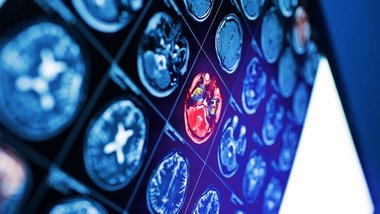23 September 2020
New research shows the potential for COVID-19 diagnosis based on stroke emergency scans.
New research from King’s College London School of Biomedical Engineering & Imaging Sciences has found that COVID-19 may be diagnosed on the same emergency scans intended to diagnose stroke. The findings have important implications in the management of patients presenting with suspected stroke through early identification of COVID-19.
Published in the American Journal of Neuroradiology, study lead, senior lecturer in neuroimaging and consultant radiologist at King’s College Hospital NHS Foundation Trust, Dr Tom Booth said the emergency scans captured images of the top of the lungs where a fluffiness known as ‘ground glass opacification’ allowed COVID-19 to be diagnosed.
225 patients were examined from three London Hyper-Acute Stroke Units. The emergency stroke scan consisted of a computed tomography (CT) of the head and neck blood vessels.
Dr Booth said the results show that when the team saw these changes in the top of the lungs during the emergency scan, they were able to reliably and accurately diagnose COVID-19 and the changes also predicted increased mortality. He said:
This is particularly relevant given the limitations of currently available Severe Acute Respiratory Syndrome Coronavirus 2 (SARS-CoV-2) reverse transcriptase-polymerase chain reaction (RT-PCR) testing as it takes time to complete the test and sometimes it is inaccurate.
Dr Booth continue:
Additionally, our data have prognostic information given the increased mortality in those with lung changes shown in our cohort.
These are useful results because the changes are simple for radiologists and other doctors to see. This is “free information” from a scan intended for another purpose yet extremely valuable.
Liked this article? Read our interview with Dr James Teo on big data and AI delivering better care in neurosciences.
To read the article in full, visit the King’s College London website.
At King’s Health Partners Neurosciences are using our collective expertise to become a global top ten Neurosciences Institute. We deliver outstanding research and education, and drive excellence in care and equity for patients with neurological conditions.





